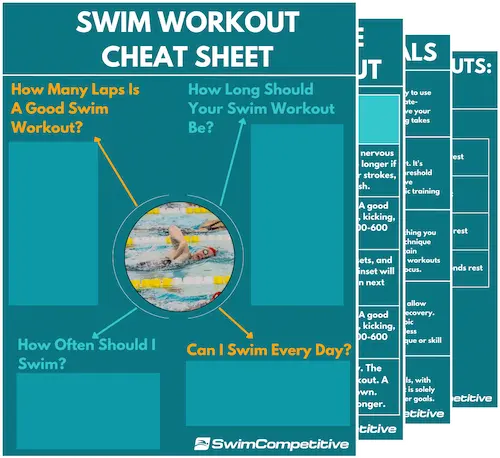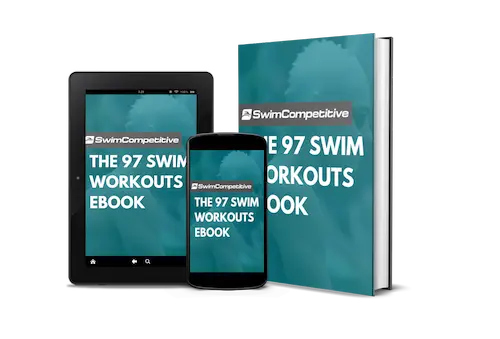Imagine you’re hopping out of the pool after a hard swimming workout. You’re feeling accomplished. But all of a sudden, an intense feeling of hunger rushes over you, and your mind races elsewhere.
But wait! You don’t even have to imagine! Because you’re a swimmer- you know this feeling of hunger all too well. But why does swimming explicitly make us so hungry compared to other exercise forms? And what can be done about it?
On the surface, this seems like quite a strange question to ask- but feeling more hungry after or during a swimming workout than other types of exercise such as running, for example, is something reported strangely often among swimmers and even other athletes.
In this article, we look at some potential reasons and theories as to why swimming makes you hungry and why swimmers eat so much. We’ll also discuss practical tips to help avoid or reduce these feelings of hunger and optimize your nutrition for ideal swimming performance.
Why Does Swimming Make You Hungry?
The exact reason why swimming makes you hungry is still unknown. However, there are some convincing theories. Some include: cold water makes you hungry, swimming burns a lot of calories and uses many muscles, dehydration, and the intensity of the swimming workout.
Here are some reasons why swimming makes you hungry-
- The pool water temperature can have a hunger-inducing effect.
- Swimming burns many calories.
- Intense swimming can create an afterburn effect.
- Low-intensity swimming can lead to hunger.
- Swimming can cause unrealized dehydration making you hungry.
- Swimmers train for many hours.
- Swimming uses many muscle groups.
1. A Cold (Or Even Normal Temperature) Swimming Pool Can Make You Hungry
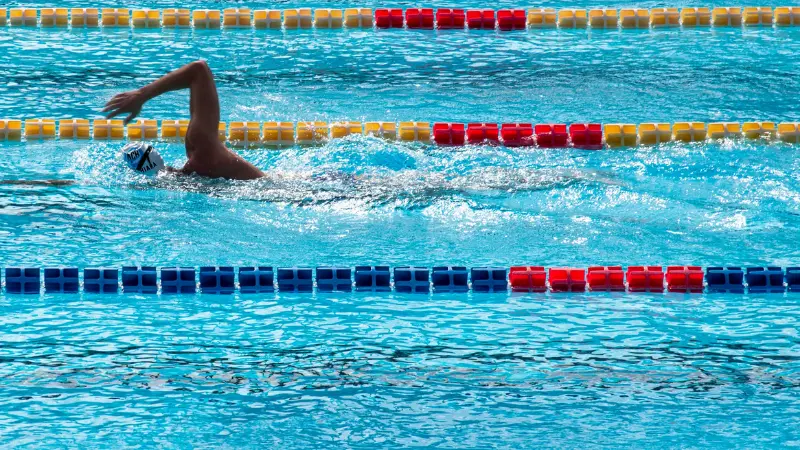
One of the most convincing theories about why swimming makes you hungry has to do with the temperature of the pools we swim in as this seems to be one of the most significant differences between standard land-based workouts and aquatic workouts.
Even standard pool temperatures tend to be 16-20˚F (8.9-11.1˚C) under the average body temperature, which is a significant difference.
Scientific evidence also backs the theory that cold water increases hunger. A study conducted by the University of Florida found that subjects who exercised in cold water (68˚F/20˚C) ate 44% more calories than subjects who exercised in warmer water (91.4˚F/33˚C). The warmer temperatures are similar to the average body temperature.
These findings come even though both groups burned nearly equal calories- 517 Calories (cold water) vs. 505 calories (warm water).
So why does this temperature difference affect our hunger? Well, one theory is that when you exercise, your body heats up as mitochondria cells in muscles generate ATP (energy) during a process called cellular respiration.
Anaerobic respiration- common during intense exercise- release up to 70% of this energy as heat, while aerobic respiration releases roughly 50% of energy as heat. Aerobic respiration normally occurs throughout the day and during light to moderate-intensity exercise.
During exercise, this process takes place much faster, and more heat is released.
Muscle contraction also releases a significant amount of heat. The chemical energy from food is only about 20-25% effective at converting to mechanical energy, and therefore 75-80% of energy is lost as heat.
Usually, during exercise, blood in the body will then temporarily be taken away from the stomach towards the skin to release this extra generated heat.
This means the digestive process is temporarily suspended or diminished, which suppresses appetite and reduces feelings of hunger.
During swimming, the same thing happens. However, your skin is kept cool by the water around you and if the water is cold enough your core body temperature might even be reduced.
This means your body takes less blood away from your stomach to transfer heat to your skin, resulting in higher digestion levels than other forms of exercise- and more hunger as a result!
But what about air temperature? Pools aren’t necessarily colder or warmer than the air around us- and many times, temperatures are nearly identical, so doesn’t that mean both are equal? Well- no.
According to Michigan Medicine, your body will lose heat in air temperature lower than 68˚F/ 20˚C at a rate of 2%. However, in cold water, your body loses heat much faster.
If you haven’t caught on yet- water will result in a far more significant reduction in body temperature than air temperatures of the same level. Meaning that the extra heat generated to produce energy during exercise simply gets (partially) canceled out by the water around you.
However, In a regular room, your body has to get rid of the heat through directed blood flow and sweating.
Another potential theory is that cold water constricts blood vessels. According to the co-author of the study discussed earlier, the constriction of blood vessels may prevent the release of hormones that would generally make you less hungry.
To tie into this, studies have shown that aerobic exercise decreases appetite by altering the hormones responsible for hunger. Thus, if blood vessels’ constriction reduces these hormonal levels, it could diminish the appetite-suppressing effect caused by exercise.
Immersing your body in cool water makes it lose heat, and this seems to prevent the release of hormones that suppress appetite.
– Michael R. Bracko (Ed.D.).
From my own swimming experience, I have also found that I tend to be much hungrier when I train in water temperatures that are colder than usual.
I definitely suspect that cold water has something to do with it- and the scientific literature seems to suggest the same- but we require more research into exactly why this happens.
2. Calorie Furnace: Swimming Burns Many Calories Making You Hungry
It’s no secret that swimming burns a ton of calories. That said, any type of exercise typically burns quite a few calories.
So although burning off a lot of calories while swimming is part of the reason for being hungry- it isn’t the culprit of the issue as other forms of exercise also burn lots of calories- some even more than swimming.
The main idea is that we get calories from the food we consume, and those calories are used as energy when exercising. Meaning if we were to burn more calories from swimming, we would be hungrier and have to eat more than other forms of exercise.
However, as already discussed, some forms of exercise burn more calories than swimming.
A study by Harvard Medical School looked at calories burned from different forms of exercise- swimming was one of the top activities- but others ranked higher, making this theory seem invalid.
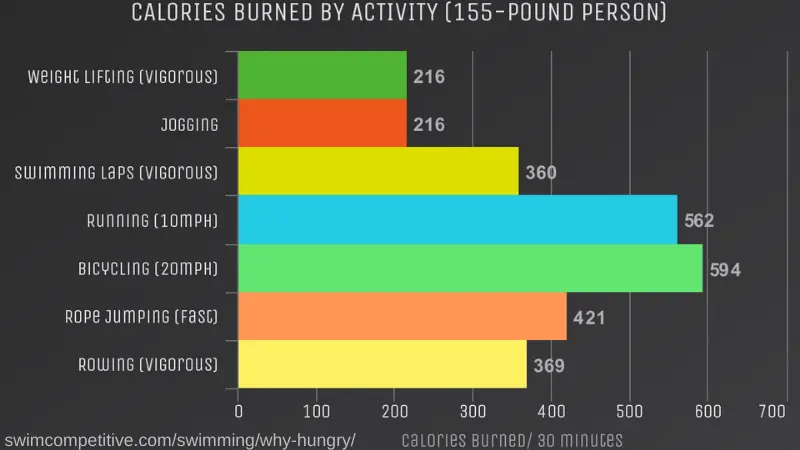
However, one potential flaw of the Harvard study is that it only looked at general lap swimming, which usually consists of just freestyle swimming.
In many cases, swimmers tend to train a combination of strokes and intensities throughout workouts. The point? Different swimming strokes burn a different number of calories.
This means the only accurate way to determine how many calories you specifically burned is by using something like a smart goggle, swim watch, or another type of swim tracker.
That said, according to the Global Triathlon Network, the combination of burning a lot of calories and a drop in core body temperature triggers your body to release more of the hunger hormone: ghrelin. In return, you feel hungrier and eat more.
3. Intense Swimming, The Afterburn Effect and Reduced Leptin
In a similar article I wrote on why swimming makes you tired, I discussed the phenomenon of excess post-exercise oxygen consumption (also known as “the afterburn effect” or EPOC) and how it can make you feel more energized after a hard workout.
But how does this translate to feeling hungrier when swimming?
In a study published in the Journal of Medicine and Science in Sports and Exercise, researchers found that participants’ metabolic rate increased for 14 hours after a vigorous 45-minute cycling session. In the end, they ended up burning 190 calories more than on days when they didn’t do any exercise.
More calories burned throughout the day means your body needs more food, thus making you hungrier.
Another study showed similar results but found that afterburn lasted only 2-3 hours.
Evidence from Arizona State University, where researchers compared 3 bike workouts of different intensities, further supports these findings.
The study also found that more calories were burned after exercise by those who did the more intense workout, but participants burned most of those calories within the first hour. By hour 3, the difference in post-exercise calorie expenditure was less than five between the 3 intensity groups.
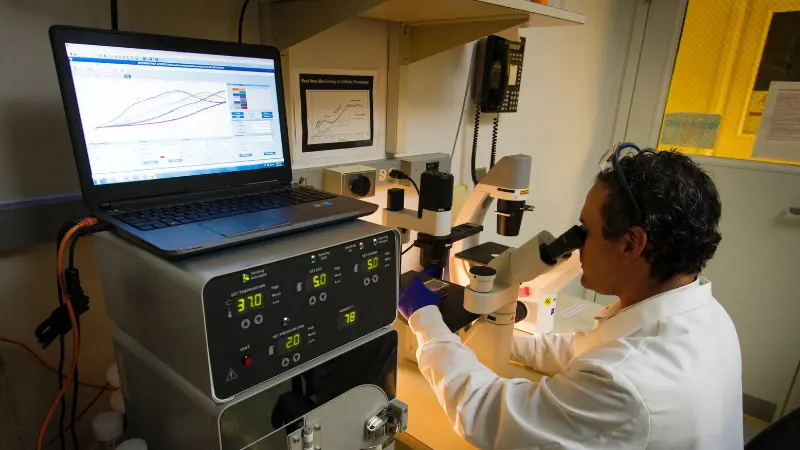
This means that the afterburn effect is undoubtedly an evident occurrence.
Although it might not last as long as commonly believed (up to 24 hours), it could well be an explanation as to why you feel hungrier in the hours following an intense swimming workout.
Further research has shown that intense exercise significantly decreases blood leptin levels in obese women, a hormone responsible for making you feel less hungry, which can also explain increased hunger after an intense workout.
That said, contradictory research suggests that intense exercise reduces hunger hormones and raises appetite-suppressing hormones. However, the same study notes that more research is required to determine whether these hormonal changes influence post-exercise food intake.
Exercise may lower levels of ghrelin, a hormone that stimulates appetite in the short term while raising levels of peptide YY, a hormone that suppresses appetite.
– David Stensel (Ph.D.).
4. Low-Intensity Swimming Can Make You Hungry As Well
Contrary to what we just discussed, many believe that low-intensity exercise such as an aerobic endurance swim workout can also lead to hunger.
This is because while some research suggests that high-intensity exercise can reduce hunger (as discussed), low-intensity exercise doesn’t seem to have the same effect, meaning you’ll most likely feel hungrier after a low-intensity workout.
The explanation? Very similar to what we discussed regarding the cold water theory-
During intense exercise, more blood circulates away from the stomach to prevent overheating, reducing digestion and appetite, but that’s not required to the same extent during less intense exercise allowing the digestive process to continue close to normal.
Do You Want to Make Every Lap Count?
Stop wasting your time in the pool feeling lost and doing directionless swim workouts, and start training effectively! Our ebook contains 97 structured and goal-orientated swim workouts to help you become a better, faster, and fitter swimmer. Whether you’re a complete beginner or a seasoned pro, there are a multitude of workouts for every type of swimmer.
5. Swimming Can Make You Dehydrated Without You Releasing, Resulting in Hunger
Another potential theory is one regarding dehydration.
Why dehydration? Well, according to Alissa Rumsey, a registered dietitian, and spokesperson for the American Academy of Nutrition and Dietetics, mild dehydration can cause feelings of hunger.
Mild dehydration is often masked as feelings of hunger when really your body just needs fluids.
– Allisa Rumsey.
This could be a convincing theory because swimmers often don’t realize how much they are sweating when they are in the pool- meaning many swimmers either don’t drink enough fluids- or not any at all (rookie mistake there!).
A study published in the Journal of Sports Science and Medicine found that swimmers had an average sweat rate of 123 ml per kilometer swam. Apply that to a 4-5km swimming workout, and you’re sweating 492-615 ml per workout. Nearly a full water bottle!
This means that you could be losing more fluids during a swimming workout than you realize, leading to mild dehydration and subsequently feelings of hunger.
6. Swimmers Spend Many Hours Training
Another factor that influences calories burned and hunger is training time. Unlike other sports, swimmers can typically train for far longer periods and often do multiple training sessions per day.
Many professional swimmers complete 2 swimming workouts per day, lasting between 1.5 to 2 hours. On top of that, the pros typically also do 2-3 weight lifting sessions lasting an hour or more in a week.
As most professional swimmers train 6 days per week, that accounts for 27+ hours of training in a week. This doesn’t account for recovery work, driving to training, etc.
On the contrary, according to Active.Com, most professional runners do about 10 hours of actual running per week. Not accounting for other things such as recovery, rehab, and so on.
The theory is simple- the more hours you train, the more calories you burn, the hungrier you’ll be. Longer workouts also mean more extended periods that you can’t eat. This means the body will release more of the hormone ghrelin if you haven’t eaten in a while, making you hungrier.
But how is it that swimmers can train so much? Well, one of the benefits of swimming is that it’s very low impact. This means you can train for many hours without feeling any significant strain on your joints, whereas running has a far more substantial impact on the joints of your body.
That said, overuse injuries such as swimmer’s shoulder (it even has its own swimming name!) are common among swimmers due to the high training volume and repetitive movements.
Some worrying research published in the British Journal of Sports Medicine and conducted on elite swimmers in Australia found that 91% of them experienced shoulder pain. When they did an MRI scan, 69% of them had an inflamed tendon of the supraspinatus muscle in the shoulder.
7. Full Body Workout: Swimming Uses Multiple Muscle Groups at Once
An interesting theory is the fact that swimming uses multiple large (and smaller) muscle groups. If you do a combination of the different swimming strokes in your workouts, you are more than likely using nearly every muscle in your body as you swim.
The idea behind this theory is since energy usage is spread out over multiple muscle groups, it can lead to an increased appetite. While this seems somewhat logical, this theory would require some research before I’d view it as a valid one.
That said, the fact that multiple muscle groups are involved will also lead to more calories burned, most likely causing increased hunger.
Why Do Swimmers Eat So Much?
If you’ve ever had a swimmer over for dinner, you were probably amazed by the amount of food that we’re able to get down and still look as athletic as we do.
I was probably eating anywhere between like eight to ten thousand calories at my peak where I was really growing.
-Michael Phelps.
So why is it that swimmers eat so much? It’s simple. Swimming burns a lot of calories. Couple that with the fact that we train endless hours, and you’ve got the ultimate calorie-burning athlete. And don’t forget- we’re always hungry as well!
The more calories you burn- the more food you require to maintain your weight and fuel your muscles for recovery. Hence is the reason why swimmers eat so much.
Keep in mind that the type of food you eat is still important- even if you’re burning many calories- and will affect your performance in training and your ability to recover.
Also, take note if you are a novice or casual swimmer, you’ll want to be mindful of what you eat. Being hungry after a workout doesn’t always mean that you burned as many calories as you might think, and may lead to unwanted weight gain if you overeat after a workout to suppress the hunger.
What to Do: How to Stop Feeling Hungry After Swimming
How to stop being hungry after swimming-
- Eat a post-swimming snack and meal.
- Increase your body temperature after swimming.
- Make sure you are well hydrated.
- Make sure you are eating right before swimming.
- Lift weights or go for a run.
Pack a Healthy Post-Swimming Snack and Meal

One of the best ways to reduce hunger is to eat directly after swimming. Not only will this reduce hunger, but it will also aid your recovery process to prepare you for your next workout.
You should consume a snack containing carbohydrates, proteins, and liquids within 30 minutes of finishing your workout. Examples are low-fat chocolate milk or a bagel with peanut butter and a glass of water. Certain bars work well too- just make sure they have plenty of carbs.
Next, you need to consume a proper meal within 2 hours of having your snack. Your meal should contain at least 50% carbohydrates as well as enough protein, healthy fats, and fruits and vegetables. Also, drink enough fluid with your meal.
Polar Bear Mode: Increase Core Body Temperature After Swimming
As discussed, swimming in colder water can reduce your core body temperature, making you feel hungrier after training.
To combat these effects, you can try heating your body as soon as possible after training.
If you have access to a sauna or hot tub, they can do wonders in quickly increasing core body temperature. Don’t have them around? Try taking a hot shower or having a hot drink such as tea. You can also simply put on some warm clothes afterward- swim parkas work great.
Make Sure You Are Well Hydrated at All Times
To combat the hunger-inducing effects of dehydration, you should make sure that you are well hydrated at all times. This includes before, during, and after training- as well as the rest of the day.
Here are some good guidelines to follow regarding hydration-
You should have two glasses of water (16 ounces/ 500ml) 2-3 hours before your workout and at least 8 ounces 30 minutes before your workout.
During your workout, you want to have 4-6 ounces/ 100-200ml of fluid every 10-20 minutes. This can either be water, a sports drink, or a combination of the two. I recommend having a sports drink on hand if your workout lasts longer than an hour.
After training, you also want to have at least one glass (8 ounces/ 250ml) of water within 30 minutes of finishing. You can drink this while you are eating your post-training snack.
I like to carry a large water bottle with me at all times. That way, I am constantly sipping on water throughout the day, and I stay hydrated at all times.
Pre-Workout Nutrition Is Important as Well
Fueling your body correctly before training is just as important as fueling it after and may reduce hunger by ensuring your body has enough energy and the appropriate nutrients.
Likewise, post-training nutrition, you want to have a meal 2-3 hours before. You should also have a light snack 30 minutes before. Make sure that these consist of a lot of carbs and a small amount of low-fat protein.
Keep the Momentum: Hit the Weights or Go for a Run
If all else fails and you’re up for extra training, or you need to get in additional land-based training sessions later in the day anyway, why not try moving those to directly after your swim?
Research discussed earlier in this article suggested that resistance training (weight lifting) or aerobic exercise (running) can reduce feelings of hunger through hormonal changes.
These activities will also be a great way to increase your core body temperature and break a sweat after swimming.
It’s Unclear Why Swimming Makes You Hungry
The exact reason why you feel uncomfortably hungry after a swimming workout compared to other forms of exercise is still unknown. That said, there are some compelling theories out there with a lot of good research and science-based evidence behind them.
Perhaps it’s not one specific factor that’s to blame- but rather some combination of the theories discussed.
At the end of the day, hunger seems to be part of the sport of swimming. Therefore, keep training hard, make sure to eat well before and after training, stay hydrated, and play around with some of the other tips to find what works best for you.
